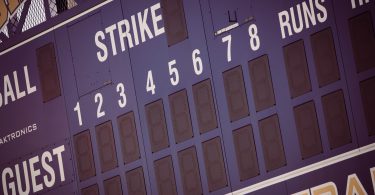By Eric Johnson
Catchers are the most important players on the field in the college game. Hands down, no exceptions. A good catcher can make the difference between a 20-win season and a 30-win season. That may sound extreme, but catchers are that important. And here’s lesson number one for you catchers, it’s not your bat that anyone cares about.
At the college level, catching is 100% about defense. A coach at one of the top ranked schools in the country this year was quoted during the regionals as saying that he would start his catcher behind the plate even if the guy were hitting .100 because he was the best defensive guy they had and he could handle their pitching staff. Defense is key; any hitting you add to the mix is a bonus.
So, what do you start working on when you want to be good enough to play at the college level? Well, the simple answer is to start with the fundamentals:
- Blocking – The ability to block balls and save your team from giving up an extra 90 feet to a base runner is vital. Nothing can get by you. It’s not fun to practice, but the best catchers take a sort of perverse satisfaction in being the guy that loves to take a hit. Learn to love throwing yourself in front of the ball. Make it into a challenge, because you can’t let anything past you.
- Receiving – Lots of pitchers in college are going to need all the help they can get with the strike zone. You’re going to be catching a mixture of guys who have no idea where the ball is going and need you to pick them up, and guys who make a living corner-pitching and need you to keep that ball that’s sinking out of the zone high enough for the ump to call it a strike. Our catcher showed up early to practice every day to use the pitching machines in the batting cages to practice receiving. He would position the machine to deliver a borderline pitch, then take a whole bucket. He was the best I ever played with at working on his craft behind the plate, and he got drafted solely for his defense. Following in his footsteps probably isn’t a bad idea.
- Throwing – Learn your strengths and weaknesses on throwing runners out. If you have a strong arm but slow feet, work to get your body moving quicker. If you have a quick release but a weaker arm, start playing long toss and practice throwing the ball hard. You need both quickness and arm strength to throw out runners in college, so don’t settle for working on only one or the other.
- Thinking – This is the most important part of catching. You are the general on the field. A lot of pitching coaches in college will call the pitches but that is no excuse for you to be a robot. Make it your job to learn the tendencies the coaches are trying to exploit in hitters. Learn pitch sequences and your pitchers’ comfort levels with certain pitches in certain counts. Most important, learn your pitchers’ minds. Know when you have to make a visit to the mound to control a situation. Some guys need to be reassured. Some just need a mental break. And some need you to get right in their faces and challenge them. Figure out what brings out the best in your staff.
Focus on the fundamentals and you can’t go wrong.







